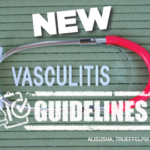 In 2021, the ACR—in concert with the Vasculitis Foundation (VF)—released four new vasculitis guidelines, one each on: 1) anti-neutrophil cytoplasmic antibody (ANCA) associated vasculitis, 2) giant cell arteritis (GCA) and Takayasu arteritis, 3) polyarteritis nodosa and 4) Kawasaki disease. The guideline development process is complex. For the vasculitis guidelines, this process kicked off in June 2017, when the core leadership team formed by the ACR first met in person. The ACR also convened expert and voting panels. Together, the core team and the two panels determined the project’s scope. Members of the literature review team assembled evidence using the most recent nomenclature system for vasculitis, the 2012 Chapel Hill Consensus Conference nomenclature.1 A panel of patients contributed as well. In this series, we discuss the updated recommendations with authors who contributed to each guideline. Read previous installments in this series.
In 2021, the ACR—in concert with the Vasculitis Foundation (VF)—released four new vasculitis guidelines, one each on: 1) anti-neutrophil cytoplasmic antibody (ANCA) associated vasculitis, 2) giant cell arteritis (GCA) and Takayasu arteritis, 3) polyarteritis nodosa and 4) Kawasaki disease. The guideline development process is complex. For the vasculitis guidelines, this process kicked off in June 2017, when the core leadership team formed by the ACR first met in person. The ACR also convened expert and voting panels. Together, the core team and the two panels determined the project’s scope. Members of the literature review team assembled evidence using the most recent nomenclature system for vasculitis, the 2012 Chapel Hill Consensus Conference nomenclature.1 A panel of patients contributed as well. In this series, we discuss the updated recommendations with authors who contributed to each guideline. Read previous installments in this series.
We continue our series with Mehrdad Maz, MD, an author of the ACR/VF guideline for GCA. Dr. Maz is a professor of medicine, director of the rheumatology fellowship training program, and chief of the Division of Allergy, Clinical Immunology, and Rheumatology at the University of Kansas Medical Center, Kansas City, Kans.
From the guideline—Recommendation: For patients with suspected GCA, we conditionally recommend temporal artery biopsy over temporal artery ultrasound for establishing a diagnosis of GCA.
Q: I believe some practical considerations led to a conditional recommendation for temporal biopsy over ultrasound. Why did the panel end up on that side of the debate?
Dr. Maz: The short answer is that this recommendation is not intended to discourage the use of ultrasound in the evaluation of patients with suspected GCA.2 Also, the objective of this guideline was to provide evidence-based recommendations and expert guidance in the U.S. Out of 22 recommendations for GCA, only one was a strong recommendation. The remainder were conditional, including the one to consider temporal artery biopsy over the use of ultrasound of the temporal artery for diagnosis of GCA.
It’s important to explain what we mean by a conditional vs. strong recommendation because it pertains to your question.
Strong recommendations are typically supported by moderate- or high-quality evidence, such as what you see in randomized controlled trials. A strong recommendation is one that would apply to all, or almost all, patients, and so only a small proportion of clinicians and patients would not want to follow the recommendation.
A conditional recommendation is supported by lower quality evidence. A conditional recommendation would apply to most patients, but the alternative is a reasonable consideration. As we go through these discussions, let’s keep these definitions in mind.


